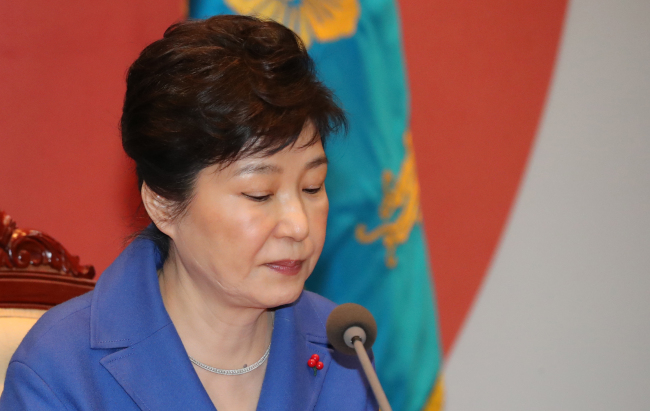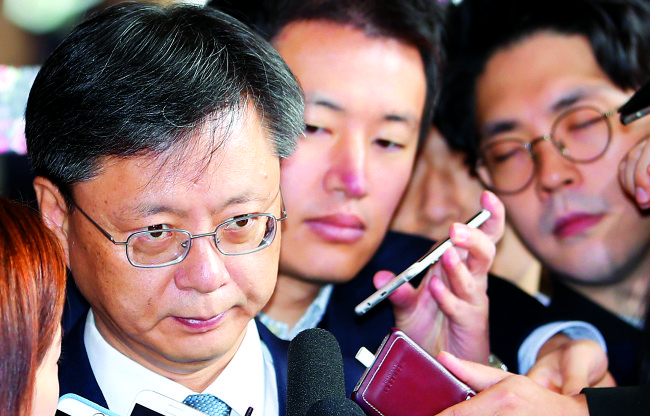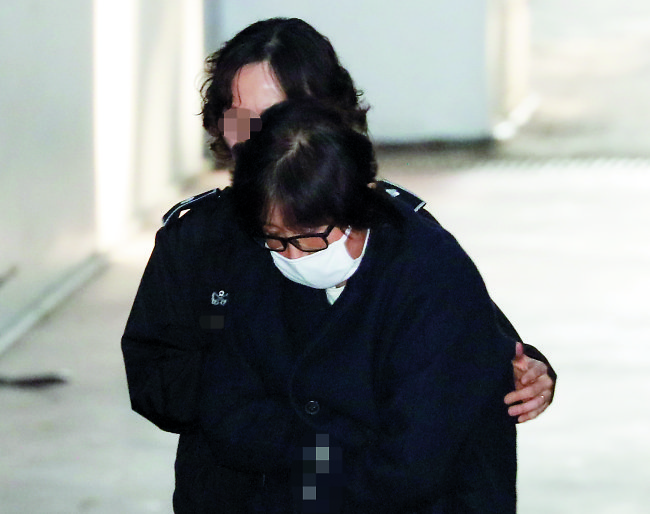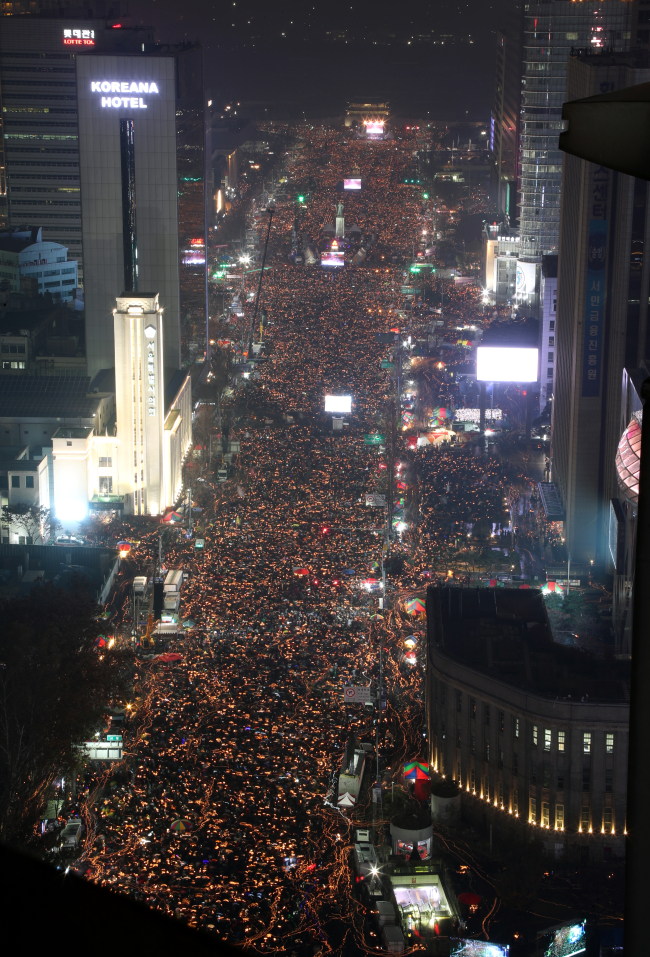Tracing the beginning of Park's fall
How a businessman's illegal gambling triggered political scandal leading to Park's impeachment
By Korea HeraldPublished : Dec. 11, 2016 - 17:34
South Korea may be nearing the end of a bizarre political saga in which a slain dictator’s daughter returns to the presidential palace as an elected leader and falls from disgrace upon the revelation she has been a “puppet” of a mysterious woman with a cult background.
President Park Geun-hye’s demise, as melodramatic as it has been, had a very unlikely beginning that can be traced to a card game in Macau sometime last year.
President Park Geun-hye’s demise, as melodramatic as it has been, had a very unlikely beginning that can be traced to a card game in Macau sometime last year.

Though some links may seem tenuous, what began as a probe into a crime ring operating an illegal gambling house on the Chinese resort island uncovered corruption and peddling of influence involving baseball players, legal professionals, business tycoons, government officials and, finally, the president’s secret confidante Choi Soon-sil.
The Korea Herald went back to what appears to be the beginning of South Korea’s worst political fiasco in recent years to trace the chain of events that led to Park’s impeachment Friday.
Stage 1. Cosmetics CEO nabbed for illegal gambling
It all began with the arrest of a gangster last year.
In July 2015, a man belonging to a crime ring called the “Pan-Western Clique” was apprehended.
During the probe, it was revealed that he had operated illegal gambling sites in Macau. From his accounting book, prosecutors learned he had some high-profile clients.
Among them were Jung Woon-ho, CEO of cosmetics firm Nature Republic, and four popular baseball players from Samsung Lions.
Jung was brought to the court on charges of illegal gambling of some 10 billion won ($8.5 million) in Macau. He was sentenced to a year in prison.
Stage 2. Legal corruption scandal
During the appeals process, Jung hired judge-turned-lawyer Choi Yoo-jung. Choi allegedly promised the cosmetics businessman that she would earn him bail and a lenient ruling, using her connections in the judiciary. Jung agreed to pay Choi 5 billion won in attorney fees.
But their deal turned sour when the appeals court handed down an eight-month prison term to Jung. Choi filed a complaint against Jung in April this year for assaulting her during an argument over attorney fees.
Their quarrel opened the floodgates to revelations of how lawyers who were formerly judges or prosecutors have used their personal ties with former colleagues to defend their clients in return for huge sums of money.
Choi revealed a list of eight names in legal circles -- from judges to high-powered lawyers -- whom she said Jung lobbied to get himself a favorable ruling.
On the list was Hong Man-pyo, a prosecutor-turned-lawyer, who allegedly received kickbacks from Jung in exchange for peddling influence over the prosecution.
That is when the name of Woo Byung-woo, the then-civil affairs secretary for President Park who later turned out to be key figure in what we now know as the Choi Soon-sil scandal, was first brought up with relation to irregularities.
During the trial, it was revealed that Jung had allegedly told his lawyer, “I am not worried about the ruling because Hong told me that he got Woo Byung-woo and a senior prosecutor on our side.”
It was only the tip of the iceberg of a wide range of cozy connections circulating business, political and legal circles unveiled in the months to come.
Stage 3. Lotte falls deeper in crisis
In an unexpected turn of events, the investigation into cosmetics mogul Jung Woon-ho uncovered another lobbying scandal involving Lotte Group, a large conglomerate running businesses ranging from duty-free shops to a professional baseball team.
Media reports alleged that Jung had offered kickbacks worth 1 billion won to Shin Young-ja, daughter of Lotte founder Shin Kyuk-ho, in return for getting his cosmetics brand into Lotte department stores and duty-free shops.
This added to an extensive investigation already targeting Lotte and its controlling family over allegations that they created slush funds to siphon off company funds. In the process, the group’s No. 2 man -- Vice Chairman Lee In-won -- committed suicide.
Shin Young-ja is being tried on charges of bribery in connection with Jung and embezzlement. Four other members from the Shin family, including group Chairman Shin Dong-bin – are facing charges of embezzlement and tax evasion.
Lotte is also one of the local conglomerates found to have contributed billions of won to the Mir and K-Sports foundations, both surreptitiously controlled by President Park’s longtime friend Choi Soon-sil.
Stage 4. Woo Byung-woo Gate
Despite suspicions related to the legal corruption scandal, Woo’s name was swept under the rug until local media outlets raised fresh speculations against him.
The Korea Herald went back to what appears to be the beginning of South Korea’s worst political fiasco in recent years to trace the chain of events that led to Park’s impeachment Friday.
Stage 1. Cosmetics CEO nabbed for illegal gambling
It all began with the arrest of a gangster last year.
In July 2015, a man belonging to a crime ring called the “Pan-Western Clique” was apprehended.
During the probe, it was revealed that he had operated illegal gambling sites in Macau. From his accounting book, prosecutors learned he had some high-profile clients.
Among them were Jung Woon-ho, CEO of cosmetics firm Nature Republic, and four popular baseball players from Samsung Lions.
Jung was brought to the court on charges of illegal gambling of some 10 billion won ($8.5 million) in Macau. He was sentenced to a year in prison.
Stage 2. Legal corruption scandal
During the appeals process, Jung hired judge-turned-lawyer Choi Yoo-jung. Choi allegedly promised the cosmetics businessman that she would earn him bail and a lenient ruling, using her connections in the judiciary. Jung agreed to pay Choi 5 billion won in attorney fees.
But their deal turned sour when the appeals court handed down an eight-month prison term to Jung. Choi filed a complaint against Jung in April this year for assaulting her during an argument over attorney fees.
Their quarrel opened the floodgates to revelations of how lawyers who were formerly judges or prosecutors have used their personal ties with former colleagues to defend their clients in return for huge sums of money.
Choi revealed a list of eight names in legal circles -- from judges to high-powered lawyers -- whom she said Jung lobbied to get himself a favorable ruling.
On the list was Hong Man-pyo, a prosecutor-turned-lawyer, who allegedly received kickbacks from Jung in exchange for peddling influence over the prosecution.
That is when the name of Woo Byung-woo, the then-civil affairs secretary for President Park who later turned out to be key figure in what we now know as the Choi Soon-sil scandal, was first brought up with relation to irregularities.
During the trial, it was revealed that Jung had allegedly told his lawyer, “I am not worried about the ruling because Hong told me that he got Woo Byung-woo and a senior prosecutor on our side.”
It was only the tip of the iceberg of a wide range of cozy connections circulating business, political and legal circles unveiled in the months to come.
Stage 3. Lotte falls deeper in crisis
In an unexpected turn of events, the investigation into cosmetics mogul Jung Woon-ho uncovered another lobbying scandal involving Lotte Group, a large conglomerate running businesses ranging from duty-free shops to a professional baseball team.
Media reports alleged that Jung had offered kickbacks worth 1 billion won to Shin Young-ja, daughter of Lotte founder Shin Kyuk-ho, in return for getting his cosmetics brand into Lotte department stores and duty-free shops.
This added to an extensive investigation already targeting Lotte and its controlling family over allegations that they created slush funds to siphon off company funds. In the process, the group’s No. 2 man -- Vice Chairman Lee In-won -- committed suicide.
Shin Young-ja is being tried on charges of bribery in connection with Jung and embezzlement. Four other members from the Shin family, including group Chairman Shin Dong-bin – are facing charges of embezzlement and tax evasion.
Lotte is also one of the local conglomerates found to have contributed billions of won to the Mir and K-Sports foundations, both surreptitiously controlled by President Park’s longtime friend Choi Soon-sil.
Stage 4. Woo Byung-woo Gate
Despite suspicions related to the legal corruption scandal, Woo’s name was swept under the rug until local media outlets raised fresh speculations against him.

On July 18, South Korea’s biggest, right-wing newspaper Chosun Ilbo broke news of a scandal involving local game developer Nexon, a top-ranking prosecutor and Woo.
Jin Kyung-joon, a vice ministerial-level official, was already under arrest at the time on suspicion of receiving kickbacks in the form of cash and unlisted shares from Nexon founder Kim Jung-ju.
The newspaper revealed that Nexon, possibly at the request of Jin, had purchased land from Woo’s family, who had trouble selling it, at a price much higher than its market value.
The report alleged that Woo, in return, turned a blind eye to the shady connection between Jin and Nexon. Woo was at that time a presidential secretary in charge of inspections of various government agencies, including the prosecution and had overseen the vetting process of Jin for promotion in 2015.
The next day, a left-wing daily, the Kyunghyang Shinmun, brought the story back to the cosmetic CEO’s scandal, exposing that Woo had worked with Hong Man-pyo to represent Nature Republic CEO Jung until he was appointed as a presidential aide in 2014.
More allegations surfaced against Woo, but the Presidential Office maintained its silence on them, indicating President Park’s unwavering trust in him. Woo was not investigated, either.
Stage 5. Choi Soon-sil Gate
On July 26, local cable channel TV Chosun broke news about the Mir Foundation, alleging it had raised nearly 49 billion won in donations from local conglomerates in just two months through a dubious process.
Its investigation led to then-presidential secretary An Chong-bum allegedly forcing large firms to donate money to the nonprofit foundation. He reportedly threated the firms with tougher tax audits.
A few days later, the same news outlet reported on the K-Sports Foundation, which raised some 38 billion won in a similar way. It speculated that there may have been a powerful person running these foundations and peddling influence behind the scenes.
Jin Kyung-joon, a vice ministerial-level official, was already under arrest at the time on suspicion of receiving kickbacks in the form of cash and unlisted shares from Nexon founder Kim Jung-ju.
The newspaper revealed that Nexon, possibly at the request of Jin, had purchased land from Woo’s family, who had trouble selling it, at a price much higher than its market value.
The report alleged that Woo, in return, turned a blind eye to the shady connection between Jin and Nexon. Woo was at that time a presidential secretary in charge of inspections of various government agencies, including the prosecution and had overseen the vetting process of Jin for promotion in 2015.
The next day, a left-wing daily, the Kyunghyang Shinmun, brought the story back to the cosmetic CEO’s scandal, exposing that Woo had worked with Hong Man-pyo to represent Nature Republic CEO Jung until he was appointed as a presidential aide in 2014.
More allegations surfaced against Woo, but the Presidential Office maintained its silence on them, indicating President Park’s unwavering trust in him. Woo was not investigated, either.
Stage 5. Choi Soon-sil Gate
On July 26, local cable channel TV Chosun broke news about the Mir Foundation, alleging it had raised nearly 49 billion won in donations from local conglomerates in just two months through a dubious process.
Its investigation led to then-presidential secretary An Chong-bum allegedly forcing large firms to donate money to the nonprofit foundation. He reportedly threated the firms with tougher tax audits.
A few days later, the same news outlet reported on the K-Sports Foundation, which raised some 38 billion won in a similar way. It speculated that there may have been a powerful person running these foundations and peddling influence behind the scenes.

As Chosun media group continued to raise allegations against presidential aides, Rep. Kim Jin-tae of the ruling Saenuri Party, one of Park’s staunchest loyalists, exposed in August how the media firm’s editorial writer Song Hee-young had received expensive trips and favors from a local company in 2011.
The revelation tarnished the paper’s reputation, leading many of the public to question the integrity of its past news reports.
While Chosun floundered, left-leaning Hankyoreh newspaper brought the corruption allegations involving presidential aides back to life.
That is when the name Choi Soon-sil became connected to the scandal.
The daily claimed that Choi, President Park’s longtime friend and daughter of her late mentor Choi Tae-min, was the one behind the Mir and K-Sports foundations.
Stage 6. Full-blown Park Geun-hye scandal
On Oct. 24, cable TV network JTBC claimed to have found Choi Soon-sil’s tablet computer containing over 200 presidential documents, including scripts of Park’s speeches with apparent signs of editing.
Mindful of the explosiveness of the revelation, Park made a rare public address the following day. She apologized and admitted to having sought Choi’s advice on public speeches. Park described Choi as someone who had been by her side at “difficult times.”
Follow-up news reports, however, revealed that Choi’s advice was far-reaching.
Choi, a civilian who holds no official government post and has no policy background, is alleged to have used her ties to the president to peddle influence over state affairs, personnel appointments and force donations from local firms for the embattled foundations.
The revelation tarnished the paper’s reputation, leading many of the public to question the integrity of its past news reports.
While Chosun floundered, left-leaning Hankyoreh newspaper brought the corruption allegations involving presidential aides back to life.
That is when the name Choi Soon-sil became connected to the scandal.
The daily claimed that Choi, President Park’s longtime friend and daughter of her late mentor Choi Tae-min, was the one behind the Mir and K-Sports foundations.
Stage 6. Full-blown Park Geun-hye scandal
On Oct. 24, cable TV network JTBC claimed to have found Choi Soon-sil’s tablet computer containing over 200 presidential documents, including scripts of Park’s speeches with apparent signs of editing.
Mindful of the explosiveness of the revelation, Park made a rare public address the following day. She apologized and admitted to having sought Choi’s advice on public speeches. Park described Choi as someone who had been by her side at “difficult times.”
Follow-up news reports, however, revealed that Choi’s advice was far-reaching.
Choi, a civilian who holds no official government post and has no policy background, is alleged to have used her ties to the president to peddle influence over state affairs, personnel appointments and force donations from local firms for the embattled foundations.

Stung by an overwhelming outpouring of public anger, state prosecutors expanded its investigation team on the scandal and started to bring in Park’s key aides for questioning.
In weeks that followed, many were arrested: Choi Soon-sil, former presidential aides An Chong-bum and Jeong Ho-seong, Cha Eun-taek, Choi’s associate accused of exerting massive influence over cultural projects, and former Vice Culture Minister Kim Jong, whom one of Choi’s now-estranged associates described as Choi’s subordinate, like a “personal secretary.”
Indicting Choi, An and Jeong on Nov. 20, prosecutors said the president was an accomplice to the three, but couldn’t be prosecuted because, as sitting president, she was exempt from criminal liability.
As the scandal unfolded, Park made two more televised apologies, reshuffled personnel in the Cabinet, offered to yield some of her executive powers to the parliament and finally offered to give up her presidency in accordance with a parliament-suggested schedule and legal procedure. But none of the actions was enough to assuage public anger.
Her approval rating plummeted to a record low of 4 percent, the lowest ever for a sitting Korean president.
On Dec. 3, a record 2.32 million South Koreans took to the streets, pressuring hesitant lawmakers to impeach the scandal-ridden president.
Last Friday, Park became the second president of South Korea to be impeached. If the Constitutional Court endorses the decision, she would be the first to be dismissed by the parliament.
This, however, may not be the end of the saga.
The president denies any wrongdoing, except that she was friends with the wrong person -- Choi Soon-sil. She is determined to fight for her job and name at the Constitutional Court.
While an independent counsel continues to investigate the scandal, Choi and other key figures are to stand trial on Dec. 19.
Woo Byung-woo, the ex-civil affairs aide to Park believed to have exerted influence over the country’s judicial system, remains unscathed. So does Kim Ki-chun, Park’s longest-serving chief of staff, who on national television last week denied any knowledge of Choi Soon-sil, her now-arrested associates or any irregularities in the highest office.
By Ock Hyun-ju (laeticia.ock@heraldcorp.com)
In weeks that followed, many were arrested: Choi Soon-sil, former presidential aides An Chong-bum and Jeong Ho-seong, Cha Eun-taek, Choi’s associate accused of exerting massive influence over cultural projects, and former Vice Culture Minister Kim Jong, whom one of Choi’s now-estranged associates described as Choi’s subordinate, like a “personal secretary.”
Indicting Choi, An and Jeong on Nov. 20, prosecutors said the president was an accomplice to the three, but couldn’t be prosecuted because, as sitting president, she was exempt from criminal liability.
As the scandal unfolded, Park made two more televised apologies, reshuffled personnel in the Cabinet, offered to yield some of her executive powers to the parliament and finally offered to give up her presidency in accordance with a parliament-suggested schedule and legal procedure. But none of the actions was enough to assuage public anger.
Her approval rating plummeted to a record low of 4 percent, the lowest ever for a sitting Korean president.
On Dec. 3, a record 2.32 million South Koreans took to the streets, pressuring hesitant lawmakers to impeach the scandal-ridden president.
Last Friday, Park became the second president of South Korea to be impeached. If the Constitutional Court endorses the decision, she would be the first to be dismissed by the parliament.
This, however, may not be the end of the saga.
The president denies any wrongdoing, except that she was friends with the wrong person -- Choi Soon-sil. She is determined to fight for her job and name at the Constitutional Court.
While an independent counsel continues to investigate the scandal, Choi and other key figures are to stand trial on Dec. 19.
Woo Byung-woo, the ex-civil affairs aide to Park believed to have exerted influence over the country’s judicial system, remains unscathed. So does Kim Ki-chun, Park’s longest-serving chief of staff, who on national television last week denied any knowledge of Choi Soon-sil, her now-arrested associates or any irregularities in the highest office.
By Ock Hyun-ju (laeticia.ock@heraldcorp.com)
-
Articles by Korea Herald



















![[Today’s K-pop] Treasure to publish magazine for debut anniversary](http://res.heraldm.com/phpwas/restmb_idxmake.php?idx=642&simg=/content/image/2024/07/26/20240726050551_0.jpg&u=)